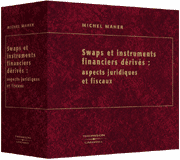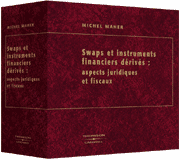

Quebec Bar' s Foudation prize, new author, 2006
Français
Discover the Book of the doctoral thesis on this
important subject
For professionals and investors
interested in financial derivative contracts:
Available now at -- Éditions
Yvon Blais / Carswell
Now
available at Carswell (French Version for the time being)
Web site at Éditions Yvon Blais publisher
Part of Tax, legal and finance collection at Carswell
As a reference tool or advice for knowing effects of financial transactions on derivative before entering into binding agreements!
THE MUTUAL
EFFECTS OF JUDICIAL QUALIFICATION OF
SWAPS AND DERIVATIVE FINANCIAL INSTRUMENTS FINANCIERS ON NATIONAL ET
INTERNATIONAL TAX TREATMENT
The new financial
instruments (NFI) on the international markets, whose the best known ones are
the derivative financial instruments, can be defined like models of contracts or
series of financial contracts having for object the transfer of the financial
risks by way of indexes based, among other things, on currencies, the interest
rates and commodity cost. The
market of NFI includes contracts of annual instalments or index bonds, the
notional principal contracts (swaps), futures, the options, or various
combinations of similar contracts or derivative financial instruments. The passage of an approach based on an economic world
of certainties in a world controlled by anticipations in evolution made it
possible to replace long term investments by more flexible short term
investments and keeping the same types of guarantees. It also amplified the possibility offered by the derivative
financial instruments to combine financial contracts according to several
strategies of financial risk management.
This book
covers the challenges at the national and international level in the view of
preserving the tax base by providing incentives supporting a responsible and
productive use of derivative financial instruments.
At the national level, we wanted to provide the foundations of a complete
and integrated tax system concerning NFIs. Assuming that the fundamentals rules for the accounting and
legal qualification of NFIs are determinant in the treatment of the taxation
problems at the national level, we suggested that an evolutive classifying
framework was the key to a long standing solutions to NFI tax related issues.
Further to a classification based on the object, we present a practical
typology of NFIs for the purposes of legal validity of the new financial
instruments as well as for their tax treatment.
At the international level, it would preferably aim at supporting the
uniformisation of the frames of reference, so that the States can lay down
precise rules concerning fiscal and monetary policies of financial derivative
instruments. It is in our view the
price at which the mobility of the capital could be reached and at which the
goal of economic integration will become reality.
Discover the update of the Book
Soon available at Carswell (French Version for the
time being)

Prix de la Fondation du Barreau du Québec, nouvel auteur, 2006
Découvrez le livre basé sur la thèse portant sur cet important sujet
Pour professionnels
de la finance, du droit, de la comptabilité, les gestionnaires de trésorerie,
les courtiers et
investisseurs intéressés aux instruments financiers dérivés:
Maintenant disponible chez Les Éditions Yvon Blais / Carswell
À titre de référence ou d'ouvrage de consultation indispensable pour connaître les effets de leurs transactions avant de s'y engager
Babillard
des éditions Yvon Blais
Nouvelles
publications juridiques chez Carswell
Description
Détail sur la mise à jour prochaine
LES EFFETS MUTUELS DE LA QUALIFICATION JURIDIQUE DES SWAPS ET DES
INSTRUMENTS FINANCIERS DÉRIVÉS SUR LE TRAITEMENT
FISCAL NATIONAL ET INTERNATIONAL
Les nouveaux instruments financiers (NIF) sur les marchés
internationaux, dont les mieux connus sont les
instruments financiers dérivatifs, peuvent être définis comme des modèles
de contrats ou de séries de contrats financiers ayant pour objet le transfert
des risques financiers au moyen d’indices basés notamment sur les devises,
les taux d’intérêts et le prix des commodités.
Le marché des NIFs comprend les contrats d'annuités ou placements
indiciels, les contrats à capital notionnels, les contrats futurs,
les options ou diverses combinaisons de placements similaires ou
d'instruments financiers dérivés.
Les intervenants de ce marché ont créé un domaine financier qui soulève
beaucoup de questions aux comptables en ce qui concerne la présentation aux états
financiers ainsi qu'aux autorités fiscales en ce qui concerne la manière d'en
traiter le rendement. Le
passage d’une approche fondée sur un monde de certitude économique à un
monde gouverné par les anticipations changeantes a rendu souhaitable le
remplacement de placements à long terme par des investissements flexibles à
court terme avec le même niveau de garantis[1]. Il
a également amplifié la possibilité offerte par les instruments financiers dérivés
de combiner des contrats financiers selon plusieurs stratégies de gestion des
risques financiers.
Cette présentation porte sur le défi au plan national et international et
discute de pistes de solutions visant à préserver les assiettes fiscales par
des mesures incitatives favorisant une utilisation responsable et productive des
instruments financiers dérivés. Au
plan international, il viserait préférablement à favoriser l’uniformisation
des cadres de références, de sorte que les États puissent établir des règles
précises concernant les politiques fiscales et monétaires en matière
d’instruments financiers dérivés. Ce
n’est qu’à ce prix que la mobilité du capital pourra être atteinte et que
l’objectif d’une intégration économique deviendra réalité.
Découvrez la mise à jour enrichie de l'ouvrage
Disponible bientôt chez Les Éditions Yvon Blais / Carswell
Babillard des éditions Yvon Blais
Nouvelles publications juridiques chez Carswell
Détail sur la mise à jour à venir prochainement
Dans le contexte où les instruments financiers dérivés
suscitent de plus en plus d’intérêts autant de la part des gestionnaires de portefeuille et de
trésorerie que des investisseurs. Dans ce contexte, et compte tenu pour la volonté de
l'auteur d'offrir la meilleure analyse de l'information disponible, on ne se surprendra pas de
nombreuses additions. On y trouvera donc désormais les éléments suivants.
[1]
Muth,
John F., « Rational Expectations and the Theory of Price Movements »,
(1961) Econometrica 29, 315-335 ; Lucas, Timothy S., « Expectations
and the Neutrality of Money », (1972) Journal of Economic Theory 4,
103-124.